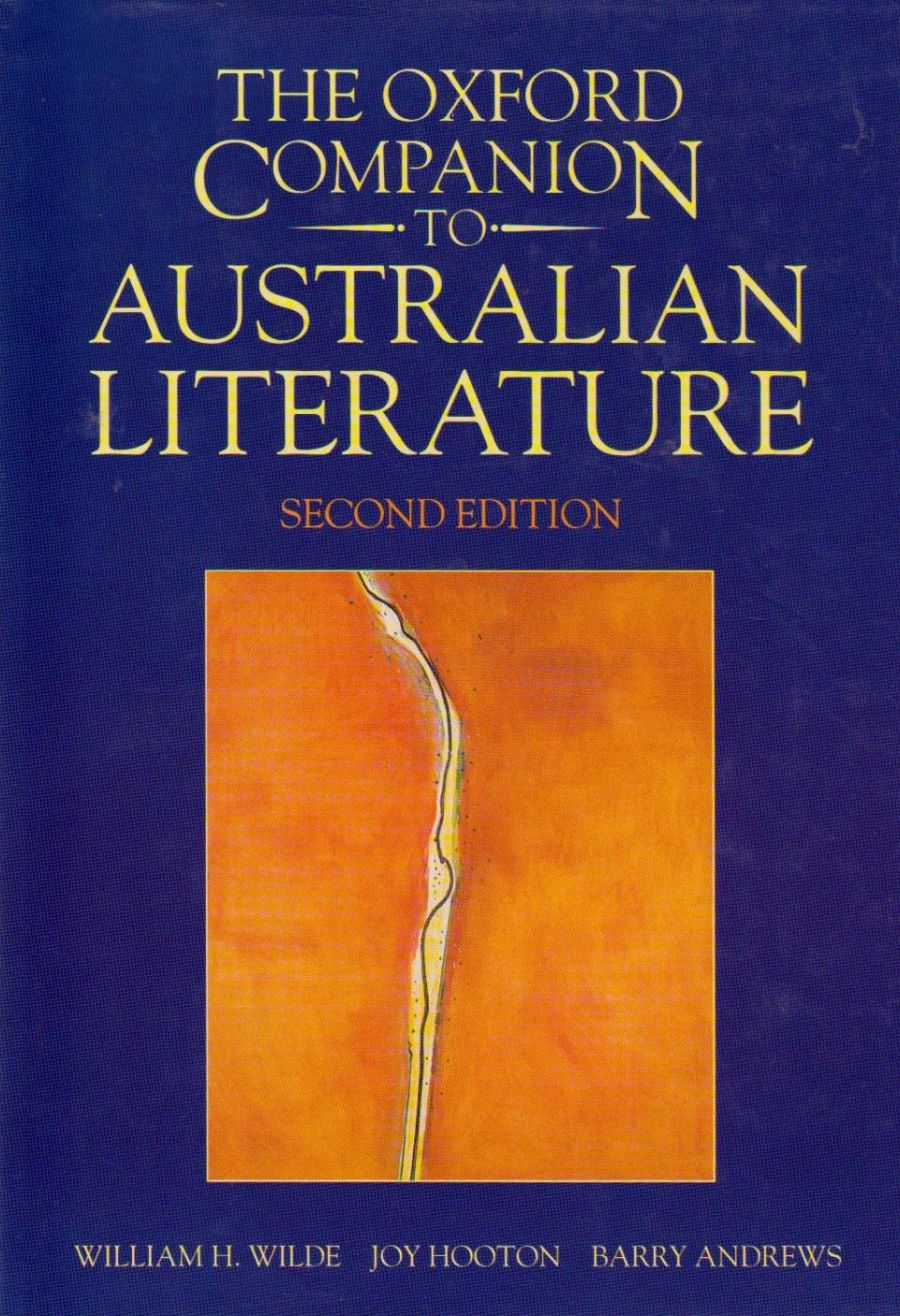
- Free Article: No
- Review Article: Yes
- Online Only: No
- Book 1 Title: The Oxford Companion to Australian Literature
- Book 1 Biblio: OUP, 760 pp., $50 hb
This is a book of fact after fact. As such it is important, welcome and will soon be indispensable. It is also a book of opinion. Some entries are highly intelligent essays. Aboriginal in Australian Literature, Aboriginal Song and Narrative in Translation, Feminism and Australian Literature. The authors William Wilde, Joy Hooton, and Barry Andrews no doubt take collective responsibility for all the entries; a small number are written by other contributors – Harry Heseltine, Sandra Burchill, Jeff Doyle, Doug Jarvis, John Laird, Trish Middleton, and Bruce Moore. The whole enterprise indicates that Australian Literature is in a very healthy state in the Department of English, Duntroon. I realise the difficulties involved in acknowledging authorship when communal responsibility is involved, but I presume
that most entries come from one hand. My own experience of communal writing has always made me feel that the biblical story of the tower of Babel could outdo any Anglo-Saxon example of understatement.
I would have liked to see the major entries signed, so that I knew who I was arguing with when, under White, Patrick, I read ‘In 1973 White won the Nobel Prize for The Eye of the Storm ...’ Not according to the Nobel Prize committee. ‘White never repeats himself, each novel creating a fresh perspective, even while remaining faithful to his central preoccupations.’ In my opinion, White has been repeating himself for forty years.
Part of the joy of this book is that opinions are risked. This also makes it idiosyncratic, and long live idiosyncrasy. Judgement takes three forms. The first is positive comment. Barbara of the same name as me: ‘A writer with a plain but suggestive prose style, Hanrahan is a brilliant creator of atmosphere.’ Mathers, Peter: ‘In both novels, Mathers’ energetic, resourceful use of language, his powers of verbal slapstick, comic exaggeration, witty parody and incisive satire, contribute markedly to the overall destructive effect.’ I agree with these judgements, which is of no importance. But it does worry me that many of the judgements do read like a Readers Digest Guide to Blurb writing. The second form of comment is in the form of ‘some say this ... others say that’. Under The Thorn Birds, you will read what ‘Its critics’ thought of it, and what ‘its supporters’ argued. Climb down to reality. McCullouch is a writer of considerable gifts who writes trash.
The third form of comment is silence. Andrew Taylor writes ‘a difficult but powerful poetry ...’ while Philip Martin is ‘a scriptwriter of literary programmes who has also published several volumes of verse ...’ Peter Goldsworthy is summarised in this way: ‘His poetry is characterised by crisp contemporary idiom and keen powers of observation.’ The report on Peter Kocan, on the other hand, is purely factual. I have two worries about this. One is the implication that positive comment obviously indicates approval (from whom?) while silence suggests disapproval. My other problem is that Fantale Readers Digest literary judgements are of little value, except at a blurb writers conference.
My final reservation is about the summaries. I have no doubt that there is immense value for the overworked tutor in having a summary of Voss. But summaries are trivialisations. Especially of poems. Hope’s ‘Australia’ and Wright’s ‘Bullocky’ do not seem to me well served by summary.
This said, please buy the book. I think it is one of the most important and interesting books ever published in this country. You’ll learn a lot, rediscover a lot, and have at your bedside a source of information that has never been available before. It is a magnificent work of scholarship and opinion. Definitely worth buying, worth arguing about.


Comments powered by CComment